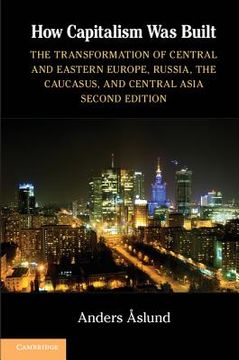Compartir
How Capitalism was Built: The Transformation of Central and Eastern Europe, Russia, the Caucasus, and Central Asia (en Inglés)
Anders Aslund
(Autor)
·
Cambridge University Press
· Tapa Blanda
How Capitalism was Built: The Transformation of Central and Eastern Europe, Russia, the Caucasus, and Central Asia (en Inglés) - Aslund, Anders
$ 57.430
$ 114.860
Ahorras: $ 57.430
Elige la lista en la que quieres agregar tu producto o crea una nueva lista
✓ Producto agregado correctamente a la lista de deseos.
Ir a Mis Listas
Origen: España
(Costos de importación incluídos en el precio)
Se enviará desde nuestra bodega entre el
Miércoles 26 de Junio y el
Miércoles 03 de Julio.
Lo recibirás en cualquier lugar de Chile entre 1 y 3 días hábiles luego del envío.
Reseña del libro "How Capitalism was Built: The Transformation of Central and Eastern Europe, Russia, the Caucasus, and Central Asia (en Inglés)"
Anders Åslund is known to make bold predictions that initially arouse controversy but soon become common wisdom. In his book Gorbachev's Struggle for Economic Reform (1989), he foresaw the collapse of the Soviet political and economic system. When others saw little but chaos, he depicted the success of Russia's market transformation in How Russia Became a Market Economy (1995). After Russia's financial crisis of 1998, although most observers declared the market economic experiment a failure, Åslund foresaw market economic success (Building Capitalism, 2002). In How Capitalism Was Built, Second Edition, he asks - and answers in depth for the twenty-one countries he investigates: - Why did communism collapse? - Why did Russia not choose gradual reforms like China did? - Wherein lies the relative success of postcommunist transformation? - How did the oligarchs arise and decline vis-à-vis authoritarian leaders? Anyone who wants to understand the often confusing postcommunist dramas and to obtain an early insight into the future will find this intellectually stimulating book useful. The second edition includes updates to each chapter as well as new chapters on the impact of the global financial crisis and the European Union on the region.

